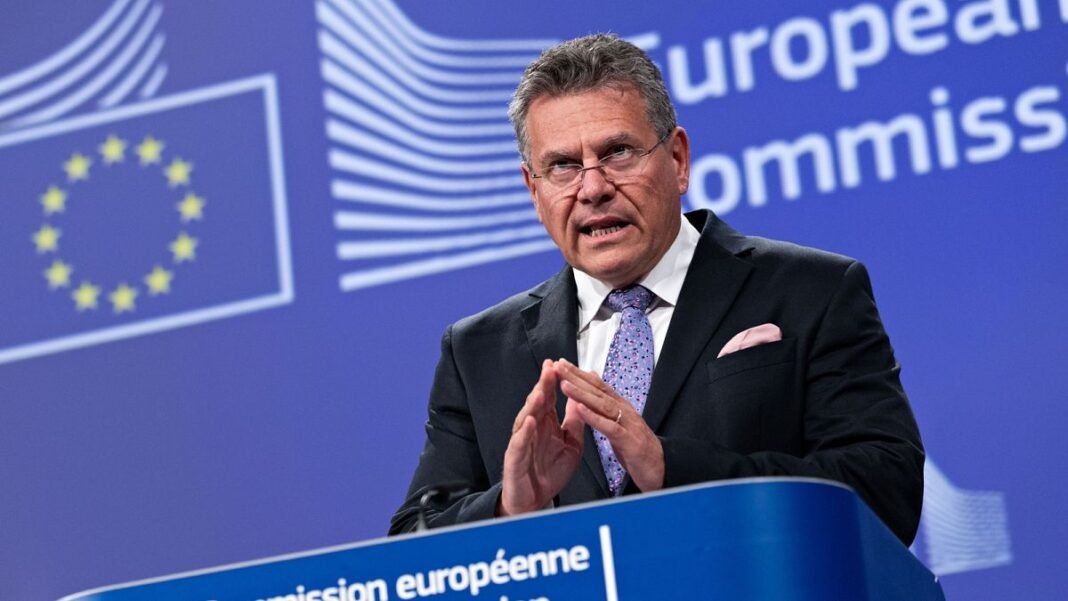The European Commission is rushing to protect its trade contracts amid growing criticism of Ursula von der Leyen and Donald Trump’s biased nature.
“This is clearly the best deal we can get under very difficult circumstances,” European Trade Commission Chairman Marosh Schiffchovich said at a press conference on Monday.
Announced deals It foresees the introduction of a total 15% tariff on EU products bound by the US market. At the same time, the majority of US products bound by the EU market will benefit from zero or virtually zero tariffs. Delicate produce such as beef, chicken and sugar have been excluded from the contract.
The 15% rate is lower 30% rate Trump threatened to hit the block with a letter sent to von der Leyen earlier this month. It is also below the 20% rate he first announced in April as part of a controversial “mutual tariff.”
But it’s significantly higher than the average rate the EU faced when it entered US soil before Trump returned to the White House.
According to Shavchovich, who sat next to von der Reyen during Sunday’s Make-or-Break meeting, Trump began negotiations by putting 30% on the table again. This led to the front and back between both sides until it settled at the 15% mark applied as “all inclusive” to block the accumulation of additional obligations.
Sifchovich said Trump’s 30% tariffs effectively halted transatlantic trade and created an “unbearable” situation with “more bad conditions” of consultations.
“It’s clear that the world that was there before April 2nd is gone, and we simply need to adjust. We need to address the challenges that come from this new approach,” the commissioner said. “And I believe that strategic cooperation with our strategic partners is a better outcome than an all-out trade war.”
“Between the plague and cholera”
The committee’s version of events has so far failed to quell the simmering frustration.
The tight differences between the 15% rate imposed on most EU goods and the 0% rate that most US goods enjoy have promoted the impression of an asymmetric arrangement in favor of Trump’s interests at the bloc’s disadvantage.
He has spent $700 billion on US energy and is committed to investing $600 billion in the US economy until the rest of Trump’s second term gives a deeper impression of winning and losing. (The pledge indicates that it is not legally binding.)
Bernd Lange, the German MEP who chairs the European Parliament’s Trade Commission and regularly contacts Shafchovich, had no doubts about his complaints.
“My initial rating: Not satisfying. This is a biased transaction. There are clear concessions that are difficult to accept,” Lange said on social media.
Kathleen Van Brempto, one of the committee’s vice-chairs, warned that, despite the more poignant and strategic autonomy goals, the contract would “depend” on American fuel and ultimately “backfire.”
“The fundamental problem remains that Trump’s tariffs are illegal and violate virtually all existing trade rules,” Van Bremp said. statement. “Simply accepting that European products are subject to 15% import duties (…) means that you are essentially agreeing to these illegal and mandatory tariffs.
“While avoiding a heavy 30% tariff is definitely a relief,” she added. “But this remains a choice between plague and cholera.”
Valerie Heyer, president of the liberal renewal European group, said he paid a “heavy price.” The agreed terms would lead to a “great imbalance” between the two sides, with Green’s co-chair Terry Reinke being stolen from the cave by “bullying tactics and the threat of President Trump.”
“This is not a way to do business,” Reintke said.
Even the party of von der Leyen, the Central Right European People’s Party (EPP), was unhappy with the outcome, calling 15% a “blatant violation of WTO principles and a serious blow to European industrial competitiveness.”
“Dark Day”
EU leaders were markedly slimy in their initial responses, welcomed the deal as an anchor of “stability” and lamented the continued punitive obligation.
“This is a moment of relief, but a moment of celebration. Tariffs have increased in some areas and some important questions remain unanswered,” said Belgian Prime Minister Bad de Weber.
His Dutch counterpart Dick Schoef said “the tariffs would not have been good,” but Ireland’s Michelle Martin predicted trade would be “more expensive” and “more challenging” despite being heavily dependent on the US market.
Spain’s Pedro Sanchez was visibly indifferent. “In any case, I support this trade agreement, but I do so without any kind of enthusiasm,” he said.
In France, the Prime Minister explained An agreement to be a “dark day” for “submission.”
The statement reveals a sense of disappointment and frustration that has grasped the EU since the start of Trump’s second term. Republicans bulldozed decades of transatlantic principles alone to promote his “America First” agenda and break Western consensus on trade, technology, climate and defense.
At his press conference, Sifchovich said geopolitics played a role in the act of balancing committees prior to in-person meetings in Scotland.
“It’s not just about trade. It’s about security. It’s about Ukraine. It’s about geopolitical volatility now,” he said. “From now on, I believe we can go in the better direction.”
Personally, committee officials acknowledge that the 15% rate is “not big” and hope that Washington will treat tariffs as the biggest ceiling to prevent future escalations. But Peter Chase, a senior fellow at the German Marshall Fund, says that given Trump’s infamous mercury nature, Brussels should do better than take the obvious.
“Unfortunately, President von der Leyen and others who believe that EU concessions have purchased stability for European companies may find, unfortunately, that the man who carved US commitments under international law to create ‘leverage’ is also very likely to tear the agreement. ”
